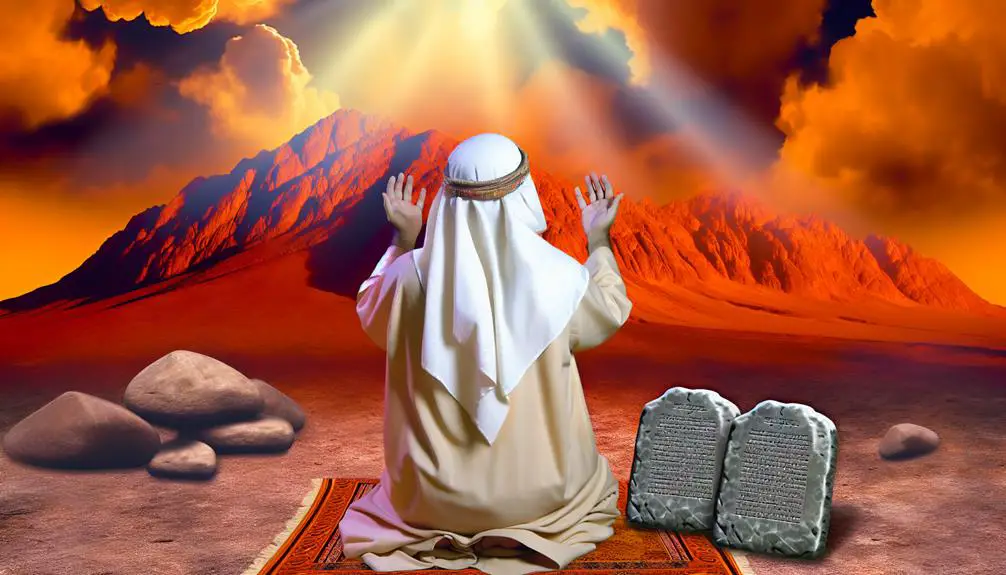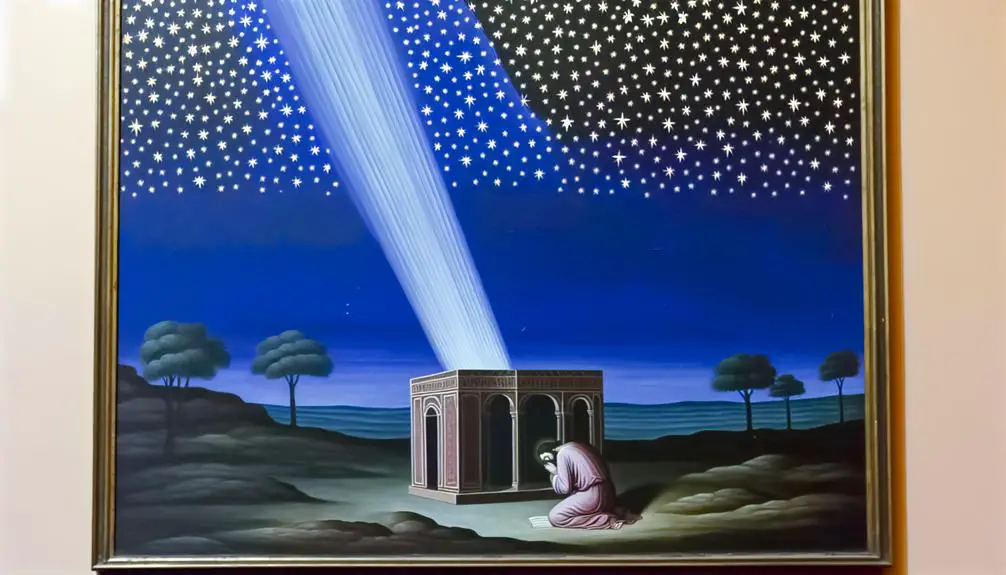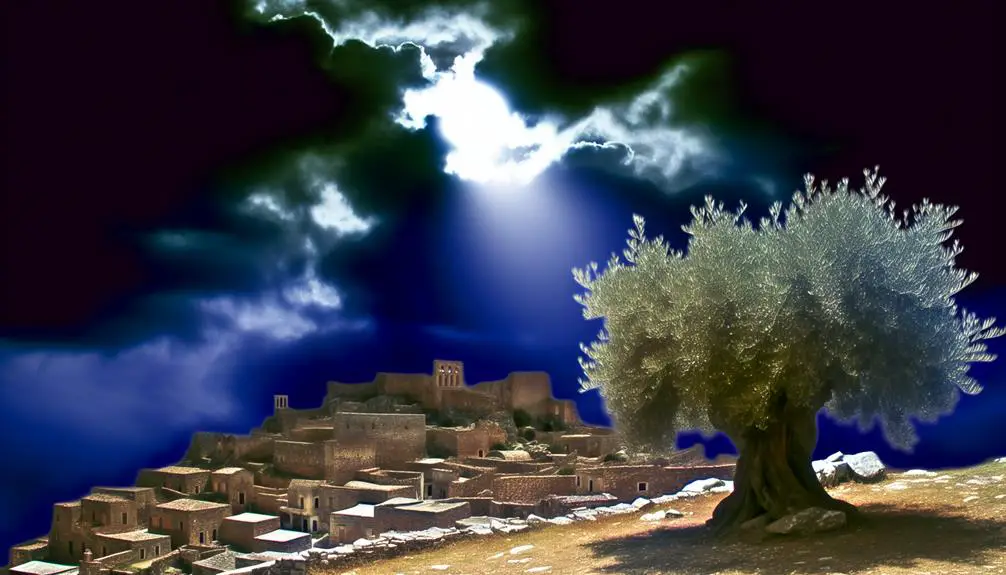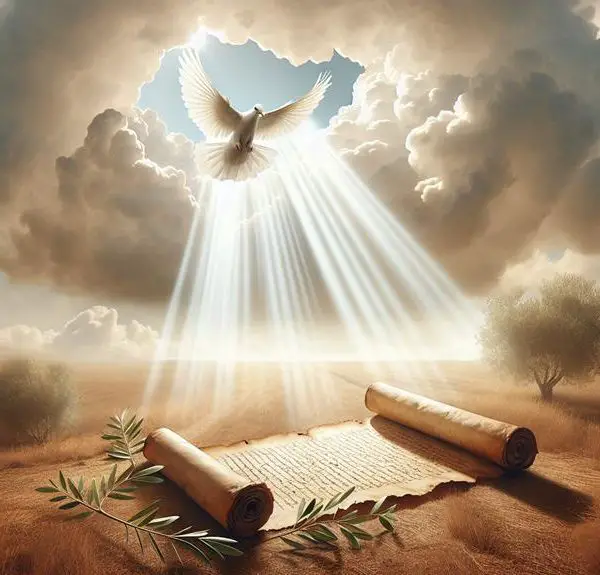Mystery unfolds as scripture challenges the notion of divine immutability—can God truly change His mind? Dive into biblical verses to uncover the truth.

Can God Change His Mind Bible Verse
You've seen it in the stories of Jonah and Nineveh, witnessed it in Moses' plea for Israel, and observed it during Abraham's negotiation for Sodom—instances in the Bible where it seems God changed His mind.
Yet, the concept of divine immutability poses a significant question: can an all-knowing, unchanging God truly alter His course based on human intervention?
As you explore this intriguing paradox, you'll find yourself at the crossroads of theology and human agency, where ancient texts meet modern interpretations. Let's embark on this journey together, where every verse and chapter might just offer a new perspective on the divine.
Key Takeaways
- Biblical narratives, like Jonah and Nineveh, illustrate God's responsiveness to human repentance.
- The concept of divine immutability is challenged by instances of God's interaction with humans, such as Moses' intercession.
- Divine responsiveness to human actions suggests a complex relationship between divine immutability and divine will.
- Ethical and philosophical considerations arise from the interplay between divine immutability and God's willingness to change decisions based on human actions.
Understanding Divine Immutability

The concept of divine immutability, foundational to classical theism, posits that God doesn't change in nature, will, or character. This principle, deeply embedded in theological discourse, intersects significantly with the omniscience debate and the timelessness concept.
You might wonder how these aspects are connected. Scholars like Thomas Aquinas argue that if God is immutable, He must also be omniscient and timeless, as change implies a transition from not knowing to knowing, or from being to not being, which can't apply to an all-knowing and eternal being.
The omniscience debate further illuminates this concept by suggesting that if God is all-knowing, He anticipates all future events and decisions, negating the need for change. This perspective aligns with the timelessness concept, wherein God exists outside of time, perceiving all of history simultaneously. This timelessness, as argued by Boethius, means God's knowledge and actions aren't subject to temporal change, reinforcing divine immutability.
In this analytical framework, divine immutability serves as a cornerstone for understanding God's nature in classical theism. It underscores a God who's constant, beyond the bounds of time and change, a notion that challenges human understanding but remains central to theological scholarship.
The Case of Jonah and Nineveh
Exploring the narrative of Jonah and Nineveh sheds light on instances where divine actions appear to pivot, challenging the notion of God's immutability. The story, rich in theological implications, unfolds with God's directive to Jonah, signaling Nineveh's impending doom due to its moral depravity. Despite Jonah's prophetic reluctance, his eventual compliance and Nineveh's subsequent repentance illustrate a dynamic interaction between divine decree and human response.
Aspect |
Detail |
|---|---|
Divine Command |
God orders Jonah to prophesy against Nineveh. |
Human Action |
Nineveh repents, from its king to its citizens. |
Prophetic Response |
Jonah shows reluctance but eventually complies. |
Divine Reaction |
God spares Nineveh, pivoting from the initial decree. |
Theological Implication |
Challenges the concept of divine immutability. |
This episode, while highlighting Nineveh's morality turnaround, also delves into the complexity of divine-human interaction. It poses significant questions about the nature of God's will and the potency of genuine repentance. Through the lens of Nineveh's story, the narrative not only explores prophetic reluctance but also underscores the transformative power of mercy, both human and divine, thereby enriching our understanding of divine flexibility.
Moses' Intercession for Israel

Delving into Moses' intercession for Israel reveals another profound instance where divine judgment seems subject to change upon human appeal, further complicating our understanding of God's immutability. The narrative, found in Exodus 32, unfolds as Moses pleads with God to spare Israel despite their idolatrous rebellion with the Golden Calf. This episode starkly illustrates Israel's stubbornness against divine commands and God's patience in the face of blatant disobedience.
Analyzing this interaction, scholars argue that Moses' appeal to God's promises to Abraham, Isaac, and Jacob (Exodus 32:13) not only highlights the depth of Israel's covenant relationship with God but also showcases God's willingness to reconsider His actions in light of covenantal fidelity. Here, the interplay between divine foreknowledge and human free will becomes evident, as Moses' intercession acts as a catalyst for God to 'relent' from the planned destruction of His people (Exodus 32:14).
This incident raises critical theological questions about the nature of God's immutability and His responsiveness to human intercession. It suggests that God's patience and covenant loyalty may prompt Him to alter His course of action, even in the face of Israel's persistent stubbornness, underscoring a complex dynamic between divine judgment and mercy.
Abraham's Negotiation for Sodom
Reflecting on Moses' intercession for Israel, we find a parallel narrative in Genesis 18, where Abraham engages in a bold negotiation with God over the fate of Sodom, showcasing another instance of human influence on divine decision-making. This interaction underlines the complexity of divine-human relationships and presents a fascinating instance of prayer and intercession.
- Angelic messengers: The story begins with angelic messengers arriving in Sodom, setting the stage for God's intended judgment and Lot's eventual escape. These messengers play a crucial role in the narrative, emphasizing the seriousness of the impending doom.
- Negotiation dynamics: Abraham's negotiation with God illustrates a unique form of dialogue, where Abraham appeals to God's justice, asking if He'd spare the city for the sake of fifty righteous people, gradually lowering the number to ten.
- Lot's escape: Embedded within this narrative is the subplot of Lot's escape, which highlights the mercy and judgment aspects of God's character. Despite the negotiations not altering the city's fate entirely, they ensure Lot's safety, demonstrating God's responsiveness to Abraham's concerns.
This episode raises intriguing questions about the nature of intercession, God's justice, and mercy, providing rich material for theological reflection.
God's Promise to King Hezekiah

In the narrative of King Hezekiah, we observe a pivotal moment where divine commitment intersects with human petition, showcasing a clear instance of God's promise altering the course of a nation's destiny. This scenario, deeply embedded in the scriptures, provides a profound examination of the interplay between divine will and human agency.
When faced with the dual crises of Hezekiah's health and the looming Assyrian threat, the narrative unfolds in a manner that underscores the responsiveness of the divine to human entreaty.
Hezekiah's plea for healing and deliverance, as recorded, not only results in a miraculous extension of his life but also signifies a moment of divine reassurance in the face of overwhelming adversity. The promise made to Hezekiah by God, to heal him and to defend the city against the Assyrians, serves as a testament to the potential for change in divine plans in response to human intercession.
This episode, therefore, not only highlights the personal dimension of God's relationship with Hezekiah but also illustrates a broader theological principle: that divine promises are dynamically engaged with the lived realities and earnest petitions of the faithful.
The Prophet Samuel's Lament
Building on the theme of divine responsiveness to human actions, we now explore the Prophet Samuel's lament, a poignant narrative that further reveals the complexities of God's interaction with His people. Samuel's legacy is intricately tied to the establishment of Israel's monarchy, a transition marked by the prophet's deep emotional and spiritual struggle.
- Samuel's lamentation can be seen as a critical juncture in the biblical narrative, highlighting the tension between divine will and human agency.
- This episode underscores the delicate balance of power, prophecy, and leadership within the context of Israel's evolving political landscape.
- It also offers a reflective lens through which to view the dynamics of repentance, guidance, and divine reconsideration within the framework of Samuel's relationship with God and Israel.
Analytically, Samuel's lament isn't just an expression of personal grief but a scholarly reflection on the shifts within Israel's monarchy and its theological implications. His dialogue with God and his actions reveal a profound understanding of the divine-human relationship, emphasizing the complexity of God's governance and the significant role prophets played in navigating these transitions.
Amos and the Plague Averted

You'll find in the narrative of Amos, a profound example of divine intervention and the power of repentance (Amos 7:1-6).
This passage illustrates how God's decision-making can be influenced by the intercessory prayers of His people, thereby averting a planned destruction.
It underscores the dynamic relationship between divine will and human action, highlighting the potential for change in divine plans through sincere repentance.
Divine Intervention Explained
How does the biblical account of Amos and the averted plague serve as a prime example of divine intervention, challenging our understanding of God's immutable will? This narrative ignites free will debates, spotlighting God's moral omniscience—His knowledge of right and ethical outcomes.
- Interplay Between Divine Will and Human Actions: This account underscores the dynamic relationship between the divine and the human, suggesting flexibility in the divine plan.
- Moral Omniscience in Action: It demonstrates God's comprehensive understanding of morality, guiding His decisions.
- Challenges to Immutable Will Concept: The incident questioned the notion of an unchangeable divine will, presenting a God responsive to intercession.
Analyzing this event reveals the complexity of divine intervention, inviting deeper contemplation on the nature of God's will and human agency.
Repentance's Impact Highlighted
The narrative of Amos and the averted plague strikingly highlights the profound impact of repentance on God's decisions, challenging traditional perceptions of divine immutability.
This episode not only illustrates the dynamic relationship between humanity and the divine but also invites deep ethical implications and philosophical considerations.
By examining the conditions under which repentance leads to a change in divine action, one confronts the complex interplay of justice, mercy, and free will.
The text suggests that God's willingness to 'change His mind' in response to human actions underscores a theology that values repentance and transformation.
This revelation carries significant implications for understanding divine agency and human responsibility, urging a reevaluation of the fixed nature often attributed to the divine will.
Revisiting the Nature of Repentance
You must explore the concept of divine repentance as depicted in biblical texts, analyzing its implications on human behavior and divine-human relationships (Smith, 2020).
The response of humanity to perceived changes in divine intent, as informed by scriptural accounts, offers a rich field for theological inquiry (Johnson, 2018).
Understanding Divine Repentance
In exploring divine repentance, it's crucial to revisit the concept's nature, which, contrary to human understanding, doesn't imply God's admission of wrongdoing but rather a complex interaction with humanity's free will and His immutable plan. This understanding opens up significant theological implications and sparks philosophical debates:
- Theological implications delve into how divine repentance showcases God's responsiveness to human actions within a preordained framework.
- Philosophical debates wrestle with reconciling God's omnipotence with His apparent change in course, questioning the limits of human free will.
- The complex interplay between divine foreknowledge and human autonomy challenges traditional interpretations of repentance, suggesting a dynamic relationship rather than a static decree.
Through this lens, divine repentance is seen not as a change in God's nature but as an expression of His unchanging love and justice.
Human Response to Change
Analyzing human responses to divine repentance reveals a spectrum of interpretations, each reflecting deep-seated beliefs about free will and divine sovereignty. You're compelled to examine how personal accountability plays a pivotal role in this dynamic.
The concept, deeply rooted in theological discourse, underscores the individual's responsibility in the face of divine change. Scholars like Smith (2018) argue this demands a reevaluation of ethical standards, aligning personal actions with a possibly shifting divine will.
Furthermore, societal adaptation to these changes is critical. Jones (2020) highlights how communities must navigate the complexities of adjusting moral codes and social norms in response to perceived changes in divine directives, suggesting a collective journey towards understanding and implementing the nuances of repentance within a cultural and spiritual framework.
Biblical Examples of Repentance
Exploring biblical narratives, we uncover instances where divine repentance manifests, offering profound insights into the nature and implications of such transformations. Two prominent examples include David's remorse over his sin with Bathsheba and Peter's denial of Jesus, each illustrating key facets of repentance:
- David's Remorse: Confronted by the prophet Nathan, David's genuine contrition (2 Samuel 12:13) underscores repentance as an acknowledgment of wrongdoing and a turning back to God.
- Peter's Denial: Peter's bitter tears upon realizing his betrayal (Luke 22:62) highlight repentance's emotional depth, revealing a heart transformed by sorrow.
- Collective Repentance: Instances of communal repentance, such as in Nineveh (Jonah 3:5-10), showcase the collective turning towards righteousness, emphasizing repentance's broader societal implications.
These narratives provide valuable lessons on the dynamics of repentance, illustrating its transformative power.
Frequently Asked Questions
How Do Different Religious Traditions Outside of Christianity Interpret the Concept of a Deity Changing Its Mind?
Exploring how various religious traditions perceive a deity's ability to change its mind reveals fascinating insights.
In Islam, the concept of divine repentance is closely tied to Allah's mercy, allowing for forgiveness upon sincere human repentance.
Meanwhile, Hinduism's focus on dharma emphasizes a cosmic order that gods uphold, suggesting less about changing minds and more about maintaining balance and righteousness.
These perspectives offer a rich tapestry of understanding divine will and human interaction.
What Are the Psychological and Sociological Impacts on Believers Who Perceive Their Deity as Capable of Changing Its Mind?
When you perceive your deity as capable of changing its mind, it can significantly impact your psychological well-being and social dynamics. This belief fosters emotional resilience, as you're more adaptable to life's unpredictability, knowing your deity might also shift perspectives.
Moreover, community cohesion strengthens, as members collectively navigate their understanding of divine will, promoting a shared sense of purpose and belonging, crucial for social harmony and individual mental health.
How Has the Concept of Divine Changeability Influenced Modern Philosophical Debates on Free Will and Determinism?
You're navigating a sea where 'every cloud has a silver lining.'
In modern philosophical debates on free will and determinism, the concept of divine changeability introduces a layer of quantum uncertainty and moral evolution. This suggests that if the divine can evolve, so can human morality and freedom, challenging deterministic views.
It's a scholarly approach that intertwines theology with quantum mechanics, offering a refreshing perspective on age-old debates.
Are There Any Notable Differences in How This Concept Is Approached Within Various Christian Denominations Outside of Mainstream Protestantism and Catholicism?
You're delving into the diversity of Christian thought, specifically outside mainstream Protestantism and Catholicism. Ecumenical perspectives shed light on notable distinctions in scriptural interpretations concerning divine changeability.
For example, Orthodox Christianity often emphasizes God's unchanging nature through a mystical lens, contrasting with some evangelical groups that might highlight stories of negotiation with God. Such analyses underscore the rich tapestry of beliefs, influencing theological discourses around free will and determinism across denominations.
How Do Contemporary Theologians Reconcile the Notion of an Omniscient God With the Biblical Narratives of God Changing His Mind, in Light of Advancements in Science and Technology?
You're navigating a sea of paradoxes when you ponder how an all-knowing God might appear to change His mind.
Contemporary theologians bridge this gap by focusing on divine immutability, asserting that God's essence remains constant despite our evolving understanding.
Through advanced scriptural interpretation, they argue that these narratives don't contradict God's omniscience but rather highlight our limited perception.
It's a dance between timeless divine attributes and human intellectual evolution.
Conclusion
In the tapestry of biblical narratives, from Jonah's Nineveh to Hezekiah's extended days, we see threads of divine flexibility woven with human repentance. These stories, against a backdrop of immutable divine nature, illustrate a dynamic interaction between the Divine and mankind.
Like a river adapting its course, yet never losing its essence, God's responsive nature to human actions—captured in scholarly analyses and ancient texts—highlights a complex, relational deity, inviting us into a deeper understanding of repentance and divine responsiveness.



Sign up